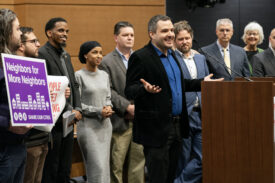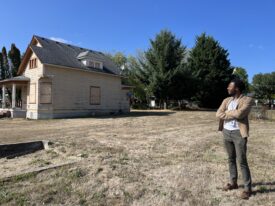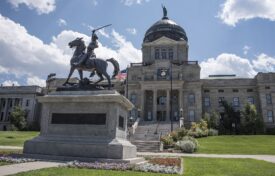I wrote yesterday about the new study that found major declines in traffic congestion in 2008. But to me, there’s an even more interesting point hiding in the data: population size is the best single predictor of a city’s traffic congestion. It’s a fact that often gets lost in discussions of a congestion, but it’s true nonetheless: all else being equal, the more people there are in a metro area, the more congestion it has.
Take Portland. As INRIX reports, Portland was the 23rd largest metro area in the country in 2008—and its congestion ranked 23rd worst in the country. Similarly, the two largest US cities by population, New York and LA, ranked second and first, respectively, in total congestion.
Looking across all 100 cities that INRIX studied, the correlation is clear: the larger the urban population, the greater the congestion. No matter how I sliced the data, the size of the urban population explained between 80 and 90 percent of the variation in urban traffic backups. The chart below excludes a few well-correlated outliers—Chicago, LA, and NYC, which all have lots of people and lots of traffic congestion. But even without them, I still find a strong connection between metro-area population and metro-area congestion.

I think there’s a lesson here: where congestion is concerned, Northwest cities are doing just about what one would expect, given their size. Demagogues would have you believe that there’s some sort of easy solution to congestion. (Build more roads!! Get rid of carpool lanes!!) But the evidence suggests that easy solutions are hard to come by. Geographically constrained metro areas—think New York and San Francisco—have congestion that’s roughly in line with their population size. The same is true for cities that have no real geographic limits, and where low-density sprawl & exurban highway construction has gone virtually unchecked. Dallas-Fort Worth falls in the latter category: a large, sprawling metropolis with lots of highways. It’s ranked 4th in population and…4th in the overall severity of congestion.
Perhaps, then, we should stop looking for the easy fix for congestion. Across all of those “laboratories of democracy” in all those different states and metro areas, nobody’s found a solution to congestion—at least, not one that clearly counteracts the pressure of a rapidly expanding population. As long as roads are free, gas is cheap, and there’s a lot of people trying to get a lot of places at once, I figure that traffic backups will remain a nettlesome feature of urban life.








Snowflake Seven
If you drill-down into the data for smaller cities, is there any hint that there is an efficient size for cities? Say for example cities half the size of Portland not just half the congestion, but significantly better reductions.
Clark Williams-Derry
Well, Snowflake, it’s hard to say. Once you get down to a metro area with less than a million people, congestion is generally pretty moderate—travel times are only a little bit longer during peak hours than at non-peak hours. Still, even among smaller cities there’s a fairly strong relationship between population size and congestion. (The relationship is a bit tough to discern, though, because the data aren’t fine-grained enough.)That said—the “efficient size for cities” in this context doesn’t mean fuel efficient, or economically efficient; just that there’s not much congestion. (Cities with more congestion tend to have LESS fuel consumption per capita. Strange, but true.)